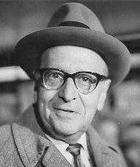
Appointed in 1930 ordinary professor of social philosophy and director of the Institute for Social Research in Frankfurt, developed a new concept of social theory with a practical emancipatory intention, which he called Critical Theory. According to the materialist-dialectical and critical guidance, no system gave way to this theory, but developed in the multidisciplinary work in a dialectical interpenetration of science and philosophy. From 1933, shortly before Hitler came to power, he emigrated, along with most of his colleagues in the Institute, the United States. There his theory was evolving into a radical criticism of the Enlightenment, which gave birth to his two major works. Dialectic of Enlightenment (2005), written in collaboration with Th W. Adorno, and Critique of instrumental reason (2002) published in this Editorial. After his return to Germany, he took back for a brief period, academic activity and the direction of the Institute, but not reissued his Critical Theory. Its production is limited in the new historical conditions, articles, lectures, and above all, a lucid and penetrating aphorisms, which updates the review of two fundamental aims towards a "administered world" society works and subject to rule of instrumental reason. Hence the claim of self makes Horkheimer thought as negation of the existing and religion as resistance and solidarity in the texts gathered in Longing for Justice (2000) and in Society, Reason and Liberty (2005), both published in this Editorial.




